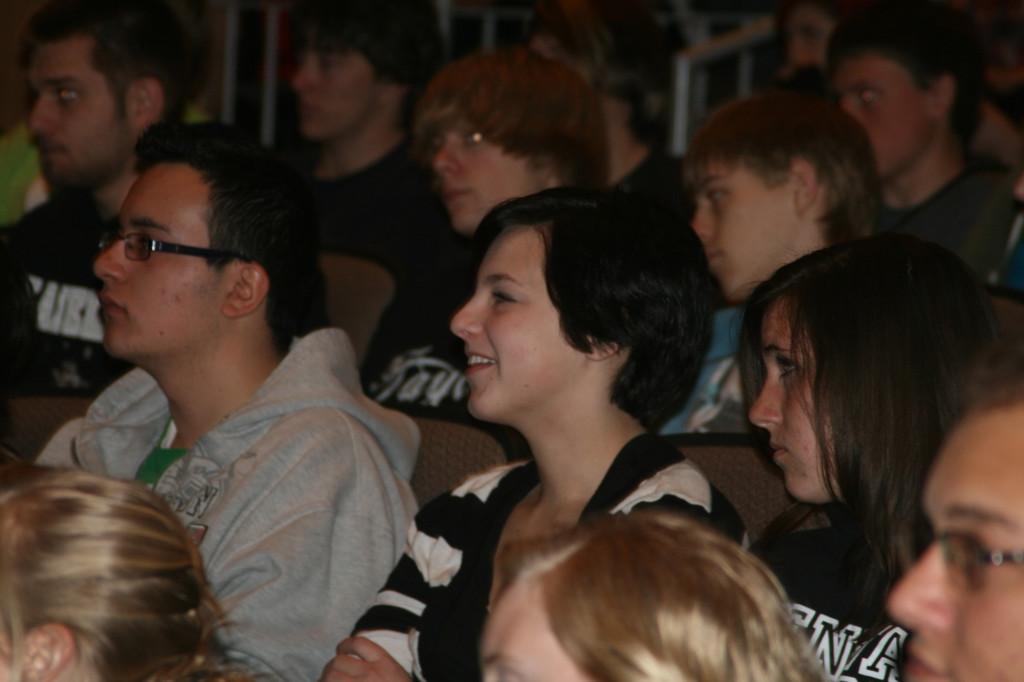PSAE promises fulfilled to seniors a year later
Senior Allie Grossman watches as the PSAE incentive prizes are given away at an assembly for seniors. Photo for Elaine Cannell.
April 26, 2011
After a year of waiting, the promise of incentives for students who met or exceeded on last year’s PSAE was finally fulfilled.
At an assembly on April 5, assistant principals Ian Smith and Diane McFarlin distributed a total of $3,565 worth of prizes to seniors—after Krier reporters inquired about whether the administration had handed them out.
Prizes ranged from $10 Best Buy and Borders gifts cards all the way to a PS3 and iPod Touch, each of which was worth $300. The money came from vending machines, soft drinks, snack sales and picture sales throughout the year.
During the assembly, Smith pointed out Krier editor-in-chief Maria Kernychny as the one who reminded him of the incentives promised, saying that the school had simply forgotten they were ever offered.
“We forgot about [the incentives] because last year was a dud,” Smith said when Kernychny approached him for an interview in March. “Maybe I was the one who said it, but if I did say it, we will do it, and follow through.”
It had become a contentious issue among seniors, who felt the administration had misled them when the promised incentives never appeared. A survey of 120 randomly-selected seniors conducted on March 16 found that 57 percent of seniors said they had tried “somewhat” or “a lot” harder on the PSAE as a result of the incentives promised at an assembly on April 27, 2010.
This caused many students to express frustration over the administration’s perceived lack of follow through before the prizes were distributed on April 5.
Senior Carissa Brenwall said she remembered the assembly from last year clearly.
“I remember them saying that if you do well, you get things like prom tickets and parking passes. I didn’t hear about anyone getting anything. That’s just outright wrong,” Brenwall said.
Yet as soon as the issue was brought to Smith’s attention, he said the school had simply forgotten, since PSAE scores arrived later than in previous years. He said the school regretted the oversight and began scheduling the assembly to distribute the prizes that same day.
While the prizes were an incentive to do well, Smith said they were also a way to say “good job” to everyone after two hard days of testing.
“We really wanted to recognize people who worked well and people who did well on this exam,” Smith said.
Some seniors were mollified that the administration did follow though in the end.
“If they can’t keep their promises, why should we try? If they don’t try, why should we? But we did get our prizes, so I’m happy about that,” senior Lindsay Jurcenko said.
Smith said it’s uncertain whether similar incentives will continue to be offered because it was unclear whether they were effective.
Meanwhile, administrators are trying a different approach that was announced to all current juniors at a separate assembly on April 5: students who meet or exceed on the PSAE this year will not be required to come to STEN next year, while those who do not will be required to come receive extra help for an extra term. Until the PSAE results arrive in mid-fall, all of next year’s seniors will be required to come to STEN.
Smith said the move was not punitive but intended to make sure all students had the skills necessary for college before graduating.
“If a student doesn’t [meet or exceed on the PSAE], it speaks to the fact that we need to get them ready for the world after high school,” Smith said.
Junior Thanasi Pesmajolgu said doing well on both tests was important.
“The ACT has become an increasingly significant test that evaluates everyone’s abilities,” Pesmajolgu said. “To achieve as much as I can, I must succeed on this test. It has become a more or less a foundation for the future. Doing well on the PSAE will allow my school’s reputation to become a lot better in terms of education and student success.”
WHAT HAPPENED WITH THE PSAE INCENTIVES? WHEN?
April 27, 2010
All juniors attended an assembly where administrators ans counselors presented a PowerPoint that explained all of the incentives for scoring high on the PSAE.
“I remember them saying they would give you free parking passes, money and prom tickets. Stuff like that,” senior Matt Gamalski said.
April 28-29, 2010
The ACT and PSAE were taken by all Kaneland juniors. Testing took place in the old middle school building, so that juniors could work on the test without bells ringing or distractions.
July 7, 2010
The state posted Kaneland’s results for PSAE online for district to see. While the district could see individual student’s scores, the state did not send printed individual score reports until the fall.
March 16, 2011
Krier reporters survey the senior class to find out what they remember about the PSAE incentives and what impact it had on their motivation; 57 percent report trying “ a lot” or “somewhat” harder due to the incentives. Many students comment about how the incentives were not received.
March 18, 2011
Krier reporters contact Assistant Principal Ian Smith and ask about the PSAE incentives. Smith immediately apologizes and schedules an assembly for April 5 on the spot to distribute the prizes.
April 27, 2011
Current seniors attended an assembly where, among other things, the administration awarded students who scored highly on PSAE with prizes. The names of all 122 seniors who met or exceeded in both reading and math on the PSAE were placed in a bucket and randomly selected.
Compiled by Amanda Schiff
Sources: Assistant Principal Ian Smith and Curriculum Coodinator Erika Schlichter



